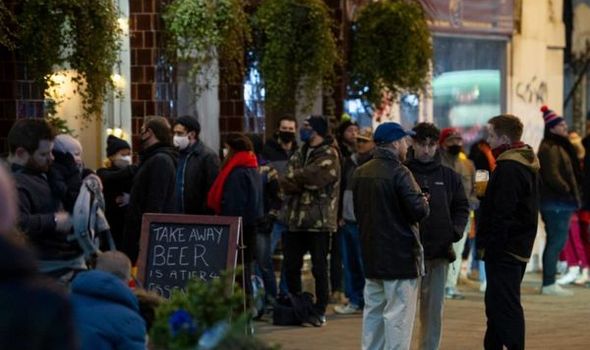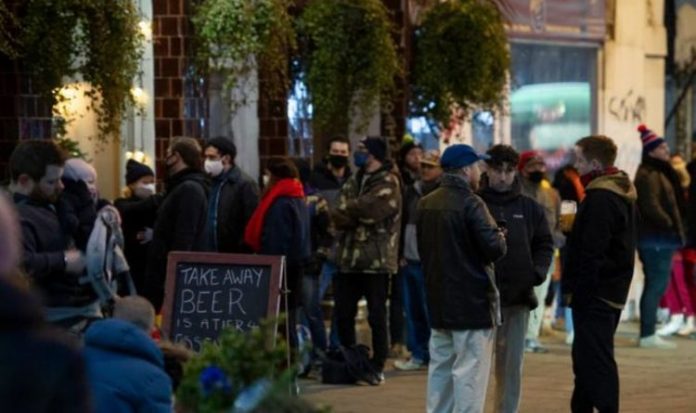COVID-19: UK cases rises to 41,385
People were earlier warned not to add “fuel to the fire” by mixing in groups, as almost half of all major hospital trusts in England deal with more Covid-19 patients than at the peak of the first wave of the virus. Figures published on New Year’s Eve – as health staff and the Government urge people to ring in 2021 within their own household at home – also show just under a third of acute trusts have more Covid-19 patients than at any point since the pandemic began. Rates of infection are rising in all regions of the country, according to the latest data from Public Health England, and the 55,892 daily lab-confirmed cases in the UK on Thursday represent the latest record high since mass testing began in late May.
Despite London being eerily quiet compared to usual New Year’s Eve celebrations, new images have shown crowds still gathered earlier to queue for a cold beer at the White Hart in New Cross, South London.
A sign outside the pub said: “Take away beer is a Tier 4 essential! Come and have a pint.”
Professor Hugh Montgomery warned that people who do not wear masks and continue to mix unnecessarily have “blood on their hands”.
The intensive care doctor at Whittington hospital in north London said anyone who thinks it is acceptable to have “one more night out” is spreading the virus.
He told BBC Radio Five Live: “Anyone who’s listening to this who doesn’t wear their mask and behaves like this – they have blood on their hands, they are spreading this virus. Other people will spread it and people will die.
“They won’t know they’ve killed people but they have.”

London news: Drinkers queue for a cold beer at the White Hart in New Cross, South London (Image: NC)
The Government said a further 964 people had died within 28 days of testing positive for Covid-19 as of Thursday, bringing the UK total to 73,512.
Public Health England medical director Dr Yvonne Doyle said: “We know the overwhelming majority of deaths reported today are people who sadly passed away in just the last few days.”
Urging people to stick to the rules in a bid to stop the spread, she said: “The Christmas week saw a worrying rise in cases across every region of the country, particularly among adults in their 20s and 30s.
“We must not now add further fuel to the fire, as meeting in close and large groups this New Year’s Eve risks further transmission.”
READ MORE: UK Covid cases break record with 55,892 recorded in 24hours
Prof Montgomery said the consequences of “bad behaviour” over Christmas will not be seen in intensive care units until next week, and the results of any similar actions by people on New Year’s Eve will be felt in hospitals about 10 days later.
Figures published on the Government’s coronavirus dashboard on Thursday showed that some 64 out of 140 acute NHS trusts were recording a higher number of Covid-19 patients at 8am on December 30 than at any point between mid-March and the end of May – covering the first wave period.
The data also shows that 42 of the 140 acute trusts had more Covid-19 patients on December 30 than at any point since the pandemic began.
New restrictions which came into effect at midnight mean a total of 44 million people, or 78% of the population of England, are now living under the toughest Tier 4 measures.
DON’T MISS
Schools reopening: Williamson insists delay essential for mass testing [VIDEO]
COVID-19 latest: Boris confident vaccine will be game changer [INSIGHT]
Hospitality will take THREE YEARS to return to pre-Covid profit levels [REVEALED]
Defence Secretary Ben Wallace said the military is standing by to staff Nightingale hospitals if the NHS exceeds its capacity of critical care beds.
A spokesman for the NHS said the Nightingale sites across England “are being readied to admit patients once again should they be needed”, and that hospitals in London are coming under significant pressure from high infection rates.
He said: “In anticipation of pressures rising from the spread of the new variant infection, NHS London were asked to ensure the London Nightingale was reactivated and ready to admit patients as needed, and that process is under way.”
Speaking to Times Radio, Mr Wallace said: “We are on, I think, 17,000 ventilator beds currently being used, of a capacity of 21,000.
“If it starts to tip over there, then of course you’ll see those Nightingales being more active and, yes, we have a number of medical staff.”
He said the Army currently has 5,000 personnel deployed in the Covid-19 response.
It is understood a request for help in Essex – over fears about critical care and bed capacity, staff sickness and the ability to discharge patients quickly into safe environments – has been received by the Ministry of Defence but that alternative options with local health partners are still being considered.
Union leaders are warning that health workers face burnout, soaring sickness levels and “intolerable” pressures because of the ongoing crisis.







